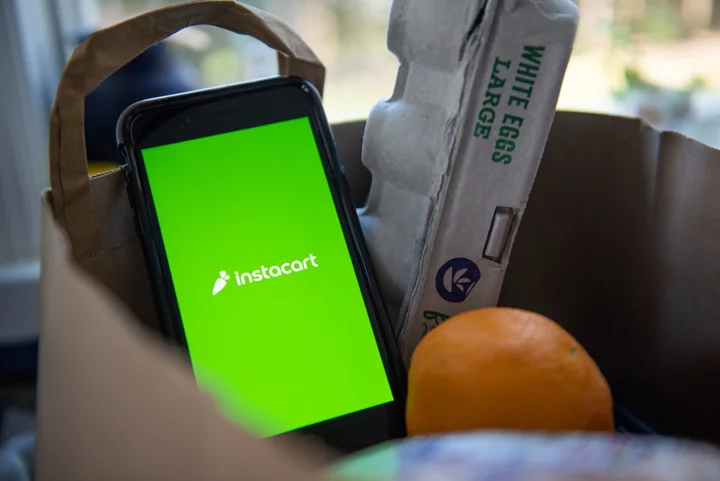Instacart has joined chip designer Arm Holdings Ltd. in moving ahead with an initial public offering, adding momentum to a return of high-profile listings.
The largest US online grocery delivery company disclosed in its filing Friday with the US Securities and Exchange Commission that PepsiCo Inc. will buy $175 million in preferred convertible stock. The San Francisco-based company also revealed it turned a profit in the first half the the year.
Instacart, which is incorporated as Maplebear Inc. and filed under that name, won’t disclose a proposed price and size for its share sale until later filings. The listing could further energize an IPO market that has been warming in fits and starts. Semiconductor designer Arm, majority owned by SoftBank Group Corp., filed Monday for what promises to be the year’s biggest IPO, which is expected in September.
Marketing and data automation provider Klaviyo filed Friday for an IPO and footwear maker Birkenstock is also gearing up, Bloomberg News has reported. Behind them are dozens of startups whose IPO aspirations have been stymied by the slowest year at this point for new listings since the depths of the financial crisis in 2009.
Founded in 2012, Instacart, has been preparing to go public for years, hoping to capitalize on its surging popularity during the coronavirus pandemic as online shopping for groceries became the norm and, in some cases, a necessity.
Instacart raised $2.74 billion as a startup and was valued at $39 billion in 2021, according to data provider PitchBook. But as the pandemic waned and diners began to emerge from lockdowns and return to restaurants and wandering the aisles at grocery stores, Instacart’s growth faded too, forcing the company to slash its internal valuation three times last year to about $13 billion by last October.
The company’s largest investors include Sequoia Capital and D1 Capital Partners, according to the filing. Other investors have included Tiger Global Management Coatue Management, according to PitchBook.
Instacart Chief Executive Officer Fidji Simo, a Facebook product veteran, took over from co-founder Apoorva Mehta two years ago and has helped Instacart move beyond grocery delivery to focus more on behind-the-scenes technology, taking advantage of the voluminous amount of consumer data it collects to help grocery stores sell more. Simo has reconfigured Instacart’s business model and fleshed out the company’s portfolio of products that it can sell to grocers, from analytics software to fulfillment services, promises of 15-minute delivery and advertising platforms.
Read More: Instacart CEO Courts Investors, Skeptical Grocers Ahead of IPO
By outfitting brick-and-mortar supermarkets like Kroger Co. and Wegmans with e-commerce tech, coupled with Instacart’s existing footprint online, Simo is betting the company will grow whether people are perusing the app at home or hand-picking tomatoes in the store.
The company has also explored tapping new income streams such as catering and stocking food for small- and midsize businesses like preschools and corporate offices, as well as a health care focus to deliver food and nutritional programs through hospitals, medical providers and insurers.
A half-dozen acquisitions have contributed to Instacart’s growth. Its largest was the $350 million purchase in 2021 of Caper AI, which offers retailers “smart” shopping carts that eliminate the need for customers to individually scan groceries or to line up at checkout.
Simo, who worked on Facebook’s News Feed advertising offerings and video features before leading Facebook’s core social network, roughly doubled Instacart’s brand partners to more than 5,500 since she joined, propelling the company’s ads business to the second-biggest revenue contributor after the core grocery delivery service.
The consumer-facing Marketplace is powered by more than 600,000 independent contractors — known as shoppers — who pick up items for consumers at more than 1,400 retailers including Kroger, Publix and Walmart, across more than 80,000 stores in North America.
As part of Simo’s push into enterprise technology, Instacart rolled out a suite of products for businesses in 2022 to help grocers that may not otherwise have the resources or technical skills to implement a digital shopping channel reach customers who are increasingly online. The platform includes tools and services that retailers can use to power their own websites, apps and retail operations and tap into Instacart’s well of insight into people’s shopping habits.
Gross transaction value increased 4% to $14.9 billion for first half of this year, according to the filing. While Instacart still commands the lion’s share of the market for large orders, over $75, DoorDash has been making significant market share gains on orders under $75, the filing shows.
Instacart’s revenue grew 31% to about $1.5 billion in six months ended June 30, aided by supercharged growth in its higher-margin advertising segment. The company had net income of $242 million for the first half, compared with a loss of $74 million for the same period last year.
Questions remain over the post-pandemic growth trajectory of Instacart as it makes big bets beyond the core delivery service.
“While we do not expect our pandemic-accelerated growth rates to recur in future periods, our growth during this period helped establish a business with much greater scale and much higher gross profit,” the company said in the filing.
The offering is being led by Goldman Sachs Group Inc. and JPMorgan Chase & Co. The company plans for its shares to trade on the Nasdaq Global Select Market under the symbol CART.
(Updates with investors in seventh paragraph)
Author: Jackie Davalos, Natalie Lung and Katie Roof

